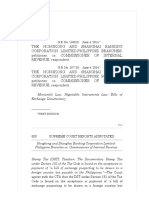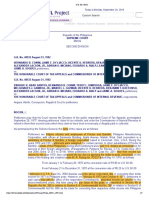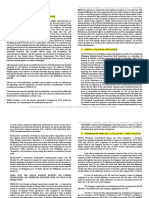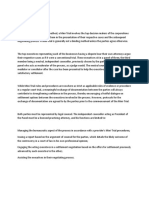0 ratings0% found this document useful (0 votes)
61 viewsFacts: Petitioners: Conwi, Et - Al. vs. CTA and CIR
Facts: Petitioners: Conwi, Et - Al. vs. CTA and CIR
Uploaded by
Burn-Cindy AbadThis case involves employees of Procter and Gamble who were assigned to foreign subsidiaries in 1970-1971 and paid in US dollars. They filed income tax returns using different conversion rates from dollars to pesos, resulting in alleged overpayments. The Court of Tax Appeals held that the proper conversion rates under Revenue Memorandum Circulars Nos. 7-71 and 41-71 should be used. The Supreme Court affirmed, finding that the petitioners' dollar earnings were income subject to Philippine taxes using the rates prescribed by the Secretary of Finance, not market rates.
Copyright:
© All Rights Reserved
Available Formats
Download as DOCX, PDF, TXT or read online from Scribd
Facts: Petitioners: Conwi, Et - Al. vs. CTA and CIR
Facts: Petitioners: Conwi, Et - Al. vs. CTA and CIR
Uploaded by
Burn-Cindy Abad0 ratings0% found this document useful (0 votes)
61 views3 pagesThis case involves employees of Procter and Gamble who were assigned to foreign subsidiaries in 1970-1971 and paid in US dollars. They filed income tax returns using different conversion rates from dollars to pesos, resulting in alleged overpayments. The Court of Tax Appeals held that the proper conversion rates under Revenue Memorandum Circulars Nos. 7-71 and 41-71 should be used. The Supreme Court affirmed, finding that the petitioners' dollar earnings were income subject to Philippine taxes using the rates prescribed by the Secretary of Finance, not market rates.
Original Description:
Tax
Original Title
Conwi
Copyright
© © All Rights Reserved
Available Formats
DOCX, PDF, TXT or read online from Scribd
Share this document
Did you find this document useful?
Is this content inappropriate?
This case involves employees of Procter and Gamble who were assigned to foreign subsidiaries in 1970-1971 and paid in US dollars. They filed income tax returns using different conversion rates from dollars to pesos, resulting in alleged overpayments. The Court of Tax Appeals held that the proper conversion rates under Revenue Memorandum Circulars Nos. 7-71 and 41-71 should be used. The Supreme Court affirmed, finding that the petitioners' dollar earnings were income subject to Philippine taxes using the rates prescribed by the Secretary of Finance, not market rates.
Copyright:
© All Rights Reserved
Available Formats
Download as DOCX, PDF, TXT or read online from Scribd
Download as docx, pdf, or txt
0 ratings0% found this document useful (0 votes)
61 views3 pagesFacts: Petitioners: Conwi, Et - Al. vs. CTA and CIR
Facts: Petitioners: Conwi, Et - Al. vs. CTA and CIR
Uploaded by
Burn-Cindy AbadThis case involves employees of Procter and Gamble who were assigned to foreign subsidiaries in 1970-1971 and paid in US dollars. They filed income tax returns using different conversion rates from dollars to pesos, resulting in alleged overpayments. The Court of Tax Appeals held that the proper conversion rates under Revenue Memorandum Circulars Nos. 7-71 and 41-71 should be used. The Supreme Court affirmed, finding that the petitioners' dollar earnings were income subject to Philippine taxes using the rates prescribed by the Secretary of Finance, not market rates.
Copyright:
© All Rights Reserved
Available Formats
Download as DOCX, PDF, TXT or read online from Scribd
Download as docx, pdf, or txt
You are on page 1of 3
Conwi, et.al. vs.
CTA and CIR
Facts: Petitioners are employees of Procter
and Gamble (Philippine Manufacturing Corporation,
subsidiary of Procter & Gamble, a foreign
corporation).During the years 1970 and 1971, petitioners
were assigned to other subsidiaries of Procter
& Gamble outside the Philippines, for which petitioners
were paid US dollars as compensation.
Petitioners filed their ITRs for 1970 and 1971, computing
tax due by applying the dollar-to-peso conversion based
on the floating rate under BIR Ruling No. 70-027. In 1973,
petitioners filed amened ITRs for 1970 and 1971, this time
using the par value of the peso as basis. This resulted in
the alleged overpayments, refund and/or tax credit, for
which claims for refund were filed.
CTA held that the proper conversion rate for the purpose
of reporting and paying the Philippine income tax on the
dollar earnings of petitioners are the rates prescribed
under Revenue MemorandumCirculars Nos. 7-71 and 41-
71. The refund claims were denied.
Issues:
(1) Whether or not petitioners' dollar earnings are receipts
derived from foreign exchange transactions; NO.
(2) Whether or not the proper rate of conversion of
petitioners' dollar earnings for tax purposes in the
prevailing free market rate of exchange and not the par
value of the peso; YES.
Held: For the proper resolution of income tax cases,
income may be defined as an amount of money coming to
a person or corporation within a specified time, whether as
payment for services, interest or profit from investment.
Unless otherwise specified, it means cash or its
equivalent. Income can also be though of as flow of the
fruits of one's labor.
Petitioners are correct as to their claim that their dollar
earnings are not receipts derived from foreign exchange
transactions. For a foreign exchange transaction is simply
that a transaction in foreign exchange, foreign
exchange being "the conversion of an amount of money or
currency of one country into an equivalent amount of
money or currency of another." When petitioners were
assigned to the foreign subsidiaries of Procter & Gamble,
they were earning in their assigned nation's currency and
were ALSO spending in said currency. There was no
conversion, therefore, from one currency to another.
The dollar earnings of petitioners are the fruits of their
labors in the foreign subsidiaries of Procter & Gamble. It
was a definite amount of money which came to them
within a specified period of time of two years as payment
for their services.
And in the implementation for the proper enforcement of
the National Internal Revenue Code, Section 338 thereof
empowers the Secretary of Finance to "promulgate all
needful rules and regulations" to effectively enforce its
provisions pursuant to this authority, Revenue
Memorandum Circular Nos. 7-71 and 41-71 were issued
to prescribed a uniform rate of exchange from US dollars
to Philippine pesos for INTERNAL REVENUE TAX
PURPOSES for the years 1970 and 1971, respectively.
Said revenue circulars were a valid exercise of the
authority given to the Secretary of Finance by the
Legislature which enacted the Internal Revenue Code.
And these are presumed to be a valid interpretation of said
code until revoked by the Secretary of Finance himself.
Petitioners are citizens of the Philippines, and their
income, within or without, and in these cases wholly
without, are subject to income tax. Sec. 21, NIRC, as
amended, does not brook any exemption.
DENIED FOR LACK OF MERIT.
You might also like
- Pre-Trial ScriptDocument3 pagesPre-Trial ScriptBurn-Cindy Abad100% (10)
- A Stranger From LagosDocument26 pagesA Stranger From Lagosapi-27513491760% (5)
- Sri City CompaniesDocument20 pagesSri City CompaniesRajan NNo ratings yet
- HSBC V CirDocument30 pagesHSBC V CirHeidiNo ratings yet
- Regulatory Guide to Money Transmission & Payment Laws in the U.S.From EverandRegulatory Guide to Money Transmission & Payment Laws in the U.S.No ratings yet
- Conwi Vs Cta 213 Scra 83Document1 pageConwi Vs Cta 213 Scra 83Darren RuelanNo ratings yet
- Conwi Et Al Vs CTADocument1 pageConwi Et Al Vs CTA001nooneNo ratings yet
- 4 Conwi V CTADocument2 pages4 Conwi V CTAkresnieanneNo ratings yet
- Conwi v. CTA, 213 SCRA 83Document2 pagesConwi v. CTA, 213 SCRA 83Homer Simpson100% (2)
- Conwi vs. CTADocument10 pagesConwi vs. CTAcmv mendozaNo ratings yet
- CONWI Vs CTADocument11 pagesCONWI Vs CTAmichelledugsNo ratings yet
- Conwi Vs CtaDocument7 pagesConwi Vs CtaJeff GomezNo ratings yet
- Tax 1 Cases Income TaxDocument31 pagesTax 1 Cases Income TaxJurico Alonzo100% (1)
- TAX - 4 - CONWI v. CTADocument1 pageTAX - 4 - CONWI v. CTAMokeeCodilla100% (1)
- Conwi vs. Commissioner (1992)Document10 pagesConwi vs. Commissioner (1992)Glenn AgbayaniNo ratings yet
- Conwi v. Cir, 213 Scra 83Document10 pagesConwi v. Cir, 213 Scra 83Ygh E SargeNo ratings yet
- Conwi v. Court of Tax Appeals, G.R. No. 48532, August 31, 1992Document6 pagesConwi v. Court of Tax Appeals, G.R. No. 48532, August 31, 1992zac100% (1)
- 1 Conwi vs. Commissioner, 213 SCRA 83Document7 pages1 Conwi vs. Commissioner, 213 SCRA 83Anne Marieline BuenaventuraNo ratings yet
- Conwi v. Cir, 213 Scra 83Document4 pagesConwi v. Cir, 213 Scra 83Anonymous iOYkz0wNo ratings yet
- 1 - Conwi vs. CTA DigestDocument2 pages1 - Conwi vs. CTA Digestcmv mendozaNo ratings yet
- CONWI V CIRDocument5 pagesCONWI V CIRYour Public ProfileNo ratings yet
- 2 Conwi vs. Court of Tax AppealsDocument9 pages2 Conwi vs. Court of Tax AppealsAriel Conrad MalimasNo ratings yet
- BIRD BOX DLONSOD TAX DIGESTS Concept of IncomeDocument5 pagesBIRD BOX DLONSOD TAX DIGESTS Concept of IncomeRalph MondayNo ratings yet
- Tax - Cases - 072017Document89 pagesTax - Cases - 072017Maria ThereseNo ratings yet
- Facts: Petitioners Are Employees of Procter and Gamble (PhilippineDocument10 pagesFacts: Petitioners Are Employees of Procter and Gamble (PhilippineSelynn CoNo ratings yet
- Conwi vs. CA (G.R. No. 48532 August 31, 1992) - 4Document8 pagesConwi vs. CA (G.R. No. 48532 August 31, 1992) - 4Amir Nazri KaibingNo ratings yet
- Case Digests TaxDocument10 pagesCase Digests TaxAron PanturillaNo ratings yet
- Taxation Law I Case Digests 2Document45 pagesTaxation Law I Case Digests 2Christopher G. Halnin75% (4)
- Income Tax CasesDocument19 pagesIncome Tax CasesDawn Lumbas100% (1)
- Summary TAX CASESDocument20 pagesSummary TAX CASESMc DalayapNo ratings yet
- Conwi v. CTADocument5 pagesConwi v. CTAMuslimeenSalamNo ratings yet
- Conwi v. CTA FactsDocument37 pagesConwi v. CTA Factsivan markNo ratings yet
- Preliminaries Tax'Document14 pagesPreliminaries Tax'J A SoriaNo ratings yet
- TAX Case AssignmentDocument18 pagesTAX Case AssignmentLex Zander BabantoNo ratings yet
- Madrigal vs. RaffertyDocument18 pagesMadrigal vs. RaffertyLeeChristineEveAlmiraNo ratings yet
- Conwi+v +Court+of+Tax+AppealsDocument2 pagesConwi+v +Court+of+Tax+AppealsPatricia Allison GaniganNo ratings yet
- TAX Final Set of CasesDocument13 pagesTAX Final Set of CasesCeleste Marie RiveraNo ratings yet
- Today Is Monday, September 24, 2018: Constitution Statutes Executive Issuances Judicial Issuances Other Issuances JDocument7 pagesToday Is Monday, September 24, 2018: Constitution Statutes Executive Issuances Judicial Issuances Other Issuances JRabelais MedinaNo ratings yet
- Case Digest Finals 1Document5 pagesCase Digest Finals 1kemsue1224No ratings yet
- GNotes Income Tax 100814 Part1Document42 pagesGNotes Income Tax 100814 Part1Migz DimayacyacNo ratings yet
- RMC No. 20-2022Document3 pagesRMC No. 20-2022Jey VlackNo ratings yet
- Cases FinalsDocument10 pagesCases FinalsNīc CādīgālNo ratings yet
- 002 - HSBC V CIRDocument3 pages002 - HSBC V CIRalexis_beaNo ratings yet
- Income Tax Reviewer: To Slander No One in My Path To GloryDocument180 pagesIncome Tax Reviewer: To Slander No One in My Path To Gloryamun dinNo ratings yet
- 37-Kuenzle & Streiff, Inc. v. CIR G.R. Nos. L-12010 and L-12113 October 20, 1959mDocument4 pages37-Kuenzle & Streiff, Inc. v. CIR G.R. Nos. L-12010 and L-12113 October 20, 1959mJopan SJNo ratings yet
- 40 BPI V CIRDocument4 pages40 BPI V CIRCarlo FernandezNo ratings yet
- CIR V British Overseas Airways CorporationDocument4 pagesCIR V British Overseas Airways CorporationcelinekdeguzmanNo ratings yet
- CIR V AMEXDocument9 pagesCIR V AMEXRina EscaladaNo ratings yet
- CIR V Burmeister and WainDocument2 pagesCIR V Burmeister and WainSusannie AcainNo ratings yet
- Osorio Tax Refund Case DigestsDocument5 pagesOsorio Tax Refund Case DigestsErwin April MidsapakNo ratings yet
- Republic of The Philippines Court Tax Appeals CityDocument13 pagesRepublic of The Philippines Court Tax Appeals CityPrintet08No ratings yet
- Tax2 - Chapter1&2 DigestsDocument22 pagesTax2 - Chapter1&2 DigestsValerie TioNo ratings yet
- CIR v. LednickyDocument19 pagesCIR v. LednickyAran Khristian MendozaNo ratings yet
- CIR V BurmeisterDocument3 pagesCIR V BurmeisterGenevieve Kristine Manalac100% (1)
- Tax CasesDocument157 pagesTax CasesRamon GarciaNo ratings yet
- Javier Assignment 28Document9 pagesJavier Assignment 28Shamraj E. SunderamurthyNo ratings yet
- Conwi vs. CTADocument4 pagesConwi vs. CTAAnonymous sMqziwneNo ratings yet
- Abello Case DigestDocument8 pagesAbello Case DigestNika RojasNo ratings yet
- TAXATIONDocument106 pagesTAXATIONNathNo ratings yet
- 68 BPI vs. CIR (GR No. 137002, July 27, 2006)Document22 pages68 BPI vs. CIR (GR No. 137002, July 27, 2006)Alfred GarciaNo ratings yet
- How to Do a 1031 Exchange of Real Estate: Using a 1031 Qualified Intermediary (Qi) 2Nd EditionFrom EverandHow to Do a 1031 Exchange of Real Estate: Using a 1031 Qualified Intermediary (Qi) 2Nd EditionNo ratings yet
- US Taxation of International Startups and Inbound Individuals: For Founders and Executives, Updated for 2023 rulesFrom EverandUS Taxation of International Startups and Inbound Individuals: For Founders and Executives, Updated for 2023 rulesNo ratings yet
- 1040 Exam Prep - Module II - Basic Tax ConceptsFrom Everand1040 Exam Prep - Module II - Basic Tax ConceptsRating: 1.5 out of 5 stars1.5/5 (2)
- Constitutional Law Chapter V - The Right To PrivacyDocument9 pagesConstitutional Law Chapter V - The Right To PrivacyBurn-Cindy AbadNo ratings yet
- Perhaps People Just Don't Want To Join Unions: by Atty. Manuel A. QuiambaoDocument4 pagesPerhaps People Just Don't Want To Join Unions: by Atty. Manuel A. QuiambaoBurn-Cindy AbadNo ratings yet
- Mini TrialDocument4 pagesMini TrialBurn-Cindy Abad0% (1)
- Motion For Extension of TimeDocument5 pagesMotion For Extension of TimeBurn-Cindy AbadNo ratings yet
- SPA Pre TrialDocument3 pagesSPA Pre TrialBurn-Cindy AbadNo ratings yet
- Vibandor NotesDocument31 pagesVibandor NotesBurn-Cindy AbadNo ratings yet
- Legal Counseling: Submitted By: La Verne Ryan Carlo A. AbadDocument5 pagesLegal Counseling: Submitted By: La Verne Ryan Carlo A. AbadBurn-Cindy AbadNo ratings yet
- Adr MediationDocument5 pagesAdr MediationBurn-Cindy AbadNo ratings yet
- Affidavit of Witness DefenseDocument2 pagesAffidavit of Witness DefenseBurn-Cindy Abad100% (2)
- Child Witness AffidavitDocument2 pagesChild Witness AffidavitBurn-Cindy Abad100% (1)
- Prosecutor ResolutionDocument3 pagesProsecutor ResolutionBurn-Cindy AbadNo ratings yet
- Worksheet 3Document6 pagesWorksheet 3ananNo ratings yet
- Bank Alfalah Limited, PMC, FSDDocument49 pagesBank Alfalah Limited, PMC, FSDmubshrasattarNo ratings yet
- KKP FullDocument18 pagesKKP FullYUSRI BIN KIPLI MoeNo ratings yet
- Hanson v. Tiger Supplies - ComplaintDocument29 pagesHanson v. Tiger Supplies - ComplaintSarah BursteinNo ratings yet
- South Indian Released Full Action Hindi Dubbed Movie New Blockbuster Action Movie 2021 - YouTubeDocument10 pagesSouth Indian Released Full Action Hindi Dubbed Movie New Blockbuster Action Movie 2021 - YouTubeMehran KhanNo ratings yet
- BSBDIV501 Assessment 1Document7 pagesBSBDIV501 Assessment 1Junio Braga100% (3)
- Dalf C1 C2Document13 pagesDalf C1 C2Lateef TopeNo ratings yet
- National University of Modern Languages - NUML: (Department of Computer Science)Document115 pagesNational University of Modern Languages - NUML: (Department of Computer Science)Mohsin AliNo ratings yet
- (English) Natural Skin Remedy (DownSub - Com)Document32 pages(English) Natural Skin Remedy (DownSub - Com)hlyghst84No ratings yet
- Bansal BillDocument1 pageBansal Billwanna.wohNo ratings yet
- Grammar: Articles A, An, TheDocument34 pagesGrammar: Articles A, An, TheMaria Beatriz SouzaNo ratings yet
- 6 Quick Test: Grammar Tick ( ) A, B, or C To Complete The SentencesDocument3 pages6 Quick Test: Grammar Tick ( ) A, B, or C To Complete The SentencesheNo ratings yet
- Argumentative Essay OutlineDocument3 pagesArgumentative Essay Outlineapi-547671509No ratings yet
- Services - Insomnio CapitalDocument1 pageServices - Insomnio Capitaljkvxctfh8hNo ratings yet
- Ra-075903 Architect Manila 6-2022Document137 pagesRa-075903 Architect Manila 6-2022MelNo ratings yet
- Triple TalaqDocument18 pagesTriple TalaqRaja IbrahimNo ratings yet
- Parts 3120789 ANSI English PDFDocument346 pagesParts 3120789 ANSI English PDFMexanik212No ratings yet
- The Haunting of Bly Manor: Best of 2020Document10 pagesThe Haunting of Bly Manor: Best of 2020Madoline PlattenbergNo ratings yet
- Name: Choose The Best Answer!Document1 pageName: Choose The Best Answer!Rubik SoekemiNo ratings yet
- Original PBE PRM 01 Rev 21 Date 8 28 15Document62 pagesOriginal PBE PRM 01 Rev 21 Date 8 28 15MEDDEB HSANNo ratings yet
- STAS Manual enDocument26 pagesSTAS Manual enchakibNo ratings yet
- Climate Consensus A Multilevel Study Testing Assump - 2020 - Journal of CriminaDocument13 pagesClimate Consensus A Multilevel Study Testing Assump - 2020 - Journal of CriminaMike Angelo Vellesco CabsabaNo ratings yet
- Side-Slipping Chords 1Document1 pageSide-Slipping Chords 1uq2No ratings yet
- Blindfolded Innocence by Alessandra Torre - Chapter SamplerDocument14 pagesBlindfolded Innocence by Alessandra Torre - Chapter SamplerHarlequinAustralia50% (4)
- Fairy Tale by Geert HofstedeDocument4 pagesFairy Tale by Geert HofstedeGulshodaNo ratings yet
- Is 13920Document47 pagesIs 13920Ravinder KumarNo ratings yet
- Statement Defence - VetEnt Case StudyDocument5 pagesStatement Defence - VetEnt Case Studyarietaloto6No ratings yet
- Prayer To Saint JosephDocument1 pagePrayer To Saint Josephfaye de leonNo ratings yet





































































































